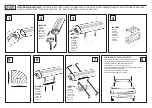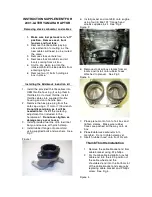
IF YOUR ENGINE OVERHEATS
In any of the following situations, you can reduce the potential for overheating by taking
the appropriate action:
•
On the highways — slow down
.
•
In city traffic — while stopped, shift transmission into NEUTRAL, but do not increase
engine idle speed
.
NOTE:
There are steps that you can take to slow down an overheat condition:
•
If your air conditioner (A/C) is on, turn it off
.
The A/C system adds heat to the engine
cooling system and turning the A/C off can help remove this heat
.
•
You can also turn the Temperature control to maximum heat, the Mode control to
floor and the Fan control to high
.
This allows the heater core to act as a supplement
to the radiator and aids in removing heat from the engine cooling system
.
•
If the temperature reading does not return to normal, turn the engine off immediately
.
•
We recommend that you do not operate the vehicle or engine damage will occur
.
Have the vehicle serviced immediately
.
WARNING!
You or others can be badly burned by hot engine coolant (antifreeze) or steam from
your radiator
.
If you see or hear steam coming from under the hood, do not open the
hood until the radiator has had time to cool
.
Never try to open a cooling system pres-
sure cap when the radiator or coolant bottle is hot
.
CAUTION!
Driving with a hot cooling system could damage your vehicle
.
If the temperature gauge
reads hot, pull over and stop the vehicle
.
Idle the vehicle with the air conditioner
turned off until the pointer drops back into the normal range
.
If the pointer remains
on hot, turn the engine off immediately and call for service
.
WHAT TO DO IN EMERGENCIES
108
















































